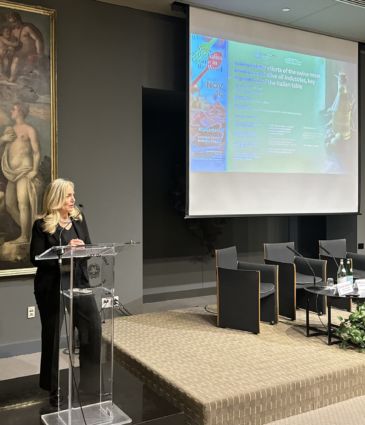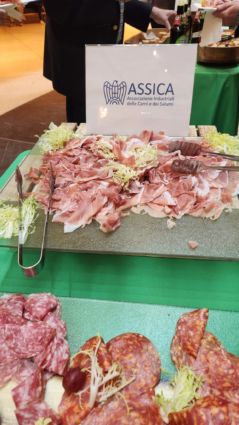
The Italian Embassy hosted a workshop entitled “Sustainability efforts of the swine meat products and olive oil industries, key ingredients of the Italian table,” which is part of ongoing events to celebrate the 2023 Settimana della Cucina Italiana nel Mondo (Week of Italian Cuisine in the World). The workshop took place on November 14 at the embassy and was organized in collaboration with the American Italian Food Coalition.
ITALIAN CUISINE & SUSTAINABILITY
Ambassador of Italy to the United States Mariangela Zappia and Director General of the Directorate for Hygiene and Food Safety and Nutrition (DGISAN) of the Ministry of Health Ugo della Marta gave welcoming remarks. Each highlighted the importance of Italian cuisine, the Mediterranean Diet and sustainability in the agriculture sector.

Sustainable agriculture involves finding a delicate balance between meeting today’s needs and preserving our planet for the future, the ambassador said. “Innovation and new technologies are effective levers to identify new solutions, working together across borders and divisions between sectors,” she added. Zappia proudly mentioned the nomination of Italian cuisine to the Unesco World Heritage List as an intangible masterpiece of the heritage for humanity and directed the audience to watch a brief video showcasing the government’s bid to have its national cuisine recognized by Unesco.
Della Marta explained how the EU Commission’s “Farm to Fork” strategy is aimed at increasing the sustainability of the European food system, and collaboration is key among the main actors for a strong European food system. There is a balance in the food industry that involves encouraging consumers to make healthy food choices while sustaining the environment. “The Mediterranean Diet is not only a healthy diet, but it is sustainable both for the environment and for the economy,” said della Marta.
OLIVE OIL SUSTAINABLE TRENDS
One key trend that Joseph R. Profaci, director of the North American Olive Oil Association (NAOOA) said his organization is noticing is how consumers value sustainability. The sustainability of olive oil matters because the world population is rapidly increasing, resulting in a decrease in land to grow olive oil trees. The toughest part of educating consumers about the sustainability of olive oil, Profaci said, is making the consumer aware that olive oil comes from a tree. A few years ago, the NAOOA conducted a survey and discovered that 30% of Americans did not believe olive oil came from olives. The NAOOA is keeping its message simple when it comes to explaining why olive oil is sustainable. It’s because olive trees are crops. Profaci acknowledged the rising prices of olive oil saying, “Yes, this is the second bad harvest in a row. Prices are going through the roof. And there is a shortage of supply.”
Marco Petrini, President of Monini North America, presented highlights from his company’s sustainability report. By 2030, Monini has pledged to plant one million olive trees. Traceability is a consumer trend Monini sees among its consumers. “We have Qr-codes on our bottles for consumers to find out what field the product comes from,” said Petrini. He added that certifications are key; consumers like them and authenticity is important.

PORK MEAT SUSTAINABLE TRENDS
“Today, our products have less salt, less fat, and more proteins and minerals than in the past,” said Monica Malavasi, Director of Istituto Valorizzazione Salumi Italiani, during her presentation. She explained the sustainable efforts that Assica, Associazione Industriali delle Carni e dei Salumi, is making in the industry. The top five countries that export Italian deli meat products are France, Germany, the United States, the United Kingdom, and Belgium. The total export value of the industry is valued at €2 billion ($2.14 billion). In 2018, Assica published a manifesto with seven values that define sustainable developments and serve as a strategy for the sector.

Thomas Titus of the National Pork Producer Council, Tri Pork Farms in Elkhart, Illinois, addressed sustainable pillars he is working on implementing in the US pork industry. Titus grows corn, soybeans and hay while also raising about 10,000 pigs annually. Building relationships is key when it comes to giving back to our community. “By working with schools and municipalities, we are working toward a sustainable future”, Titus said.
After the workshop, attendees were invited to a reception to enjoy authentic Italian cuisine and wine.
